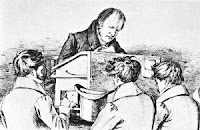Comfortably living in an environment of native land doesn't makes the fact of identity so questionable. As one moves in a new realm with different culture and values , the shell starts to break.
Landing in any new city or country, human mind first encounter is physical as it begins to register the landscape of a place. With it's first set of adjustment , is finding comfortable niches which could be compared to one's own area of upbringing. The whole process is a natural part of a human being's life where it can adjust and start accommodating changes within this new set of lifestyle.
When a person moves within the same country to a new city - there is a sense of assurance - as the languages are common and it is easier to comprehend. Many of the factors remain same or with little variant - food, weather etc. The factor which affects the person most is public transport. As it is most convenient way to know a new city. A good public transport makes a city more available for a new immigrant to explore.
Experience of moving to a new country altogether is initially shaped by pre conceived notions . In a modern world like ours plethora of images are available through media and communication technology.
The new country will be a good or bad experience depends upon the previous living conditions. Secondly it also depends whether it as an independent journey or you have someone accompanying you. More than what your mind says it is also affected by now what it is listening from a person you believe in. Gradually the new culture, language and food habits start sinking in.
Here the question of identity also keeps in popping at the background. How much can we give in of our old values and be a part of a new system? If the new system offers better solutions and more positive approach , it might be possible for the human brains to slowly accommodate. Though modern world has a definite outlook all across the globe - still there are two components embedded in human mind - food and clothing which become difficult to change totally.
Visiting a country as a tourist and living as a citizen makes a total difference!
Landing in any new city or country, human mind first encounter is physical as it begins to register the landscape of a place. With it's first set of adjustment , is finding comfortable niches which could be compared to one's own area of upbringing. The whole process is a natural part of a human being's life where it can adjust and start accommodating changes within this new set of lifestyle.
When a person moves within the same country to a new city - there is a sense of assurance - as the languages are common and it is easier to comprehend. Many of the factors remain same or with little variant - food, weather etc. The factor which affects the person most is public transport. As it is most convenient way to know a new city. A good public transport makes a city more available for a new immigrant to explore.
Experience of moving to a new country altogether is initially shaped by pre conceived notions . In a modern world like ours plethora of images are available through media and communication technology.
The new country will be a good or bad experience depends upon the previous living conditions. Secondly it also depends whether it as an independent journey or you have someone accompanying you. More than what your mind says it is also affected by now what it is listening from a person you believe in. Gradually the new culture, language and food habits start sinking in.
Here the question of identity also keeps in popping at the background. How much can we give in of our old values and be a part of a new system? If the new system offers better solutions and more positive approach , it might be possible for the human brains to slowly accommodate. Though modern world has a definite outlook all across the globe - still there are two components embedded in human mind - food and clothing which become difficult to change totally.
Visiting a country as a tourist and living as a citizen makes a total difference!







